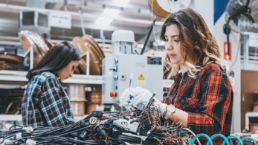
An evening of mentorship, leadership development and career exploration for motivated middle and high school girls.
Inspire the Limitless Potential in Girls
Join us on our mission to level the playing field for girls everywhere.
Women represent 50% of the US population. Yet, women make up less than 1/4 of the nation’s STEM workforce.
Why is this?
As early as age 6, girls start believing they aren’t smart or capable enough.
They have few positive women role models in STEM. So they can’t be what they can’t see!
Confidence and motivation—for STEM or anything—continues to wane during middle school.
Nurturing young women towards a career in STEM requires more than STEM education alone.
Play Like a Girl field trip to catherization lab at TriStar Skyline Medical Center.
How We Do It
our programs
Play Like a Girl leverages the transferable skills middle school girls gain from sport to give them a competitive edge in the classroom and, ultimately, propel them into competitive, male-dominated careers in STEM as young women.
Our programs connect girls with inspiring women role models and mentors, unveil the many pathways to a STEM career, and guide them toward leadership—ultimately, building girls’ confidence for a future in STEM.

Sports Build Confidence
and teaches girls to collaborate and compete.

STEM Education Empowers
girls with real-world experience and exposure.

Mentorship Creates Belief
that girls can be and do anything they can dream.
How You Can Help Level the Playing Field for Girls
Closing the gender gap in STEM is a team sport. Here’s how you can help level the playing field for girls (and women too!).

Join the Team
Explore Play Like a Girl for yourself by joining our Community and becoming a role model today.

Inspire a Girl
Be a role model or mentor to a young woman in your life, and help level the playing field.

Pay It Forward
Make a donation to help us inspire more girls and support them on their journey.

Guiding Girls Toward Success Through Mentorship
November 21, 2023
In a world where gender disparities persist, mentorship is a powerful tool…
Overcoming Barriers in STEM
November 14, 2023
In today's rapidly evolving world, the need to empower girls and provide…






